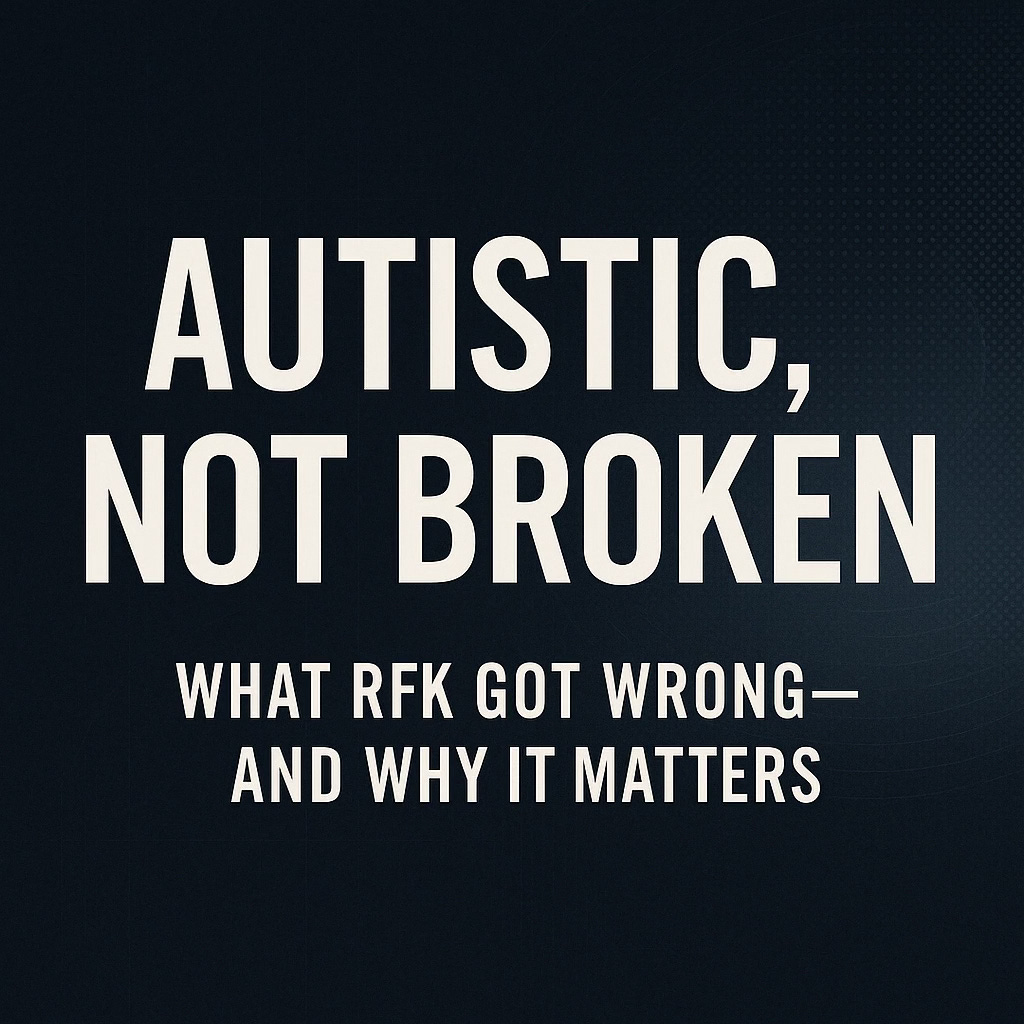TXH Series Hub: THX Pulse - Systems, Emotions & the Urgency of Now
“They will never pay taxes. Never hold a job. Never play baseball. Never write a poem. Never go out on a date. Many of them will never use a toilet unassisted.” — RFK Jr., April 16, 2025
When I heard those words, something inside me cracked open—and then seared with fury.
They weren’t just careless.
They were inhuman.
And they were wrong.
Not just statistically or medically. But morally.
My Story, Hidden in Plain Sight
I was born with physical disabilities. As a kid, I learned quickly that people didn’t always respond with compassion—they responded with pity, dismissal, or mockery. I learned to hide what made me different.
I worked twice as hard to be seen as "normal." I earned a spot on the high school basketball team and shattered records—over 30 points and rebounds per game one season—not because it came easy, but because I fought for every step. I knew it wouldn’t last. I couldn’t play in college. My body wouldn’t let me.
So I pivoted. I built a life of ideas, strategy, and business. I spoke on international stages, built companies, advised Fortune 100s, and developed customer experience frameworks now used around the world. I taught high school and college. I wrote books. I hosted podcasts.
And then recently, I was diagnosed with autism.
People were shocked. I didn’t “look autistic.” I didn’t fit their stereotype.
Because I had masked.
What Masking Really Means
Masking is when an autistic person suppresses or hides traits—stimming, sensitivity, how we speak, how we process—to appear neurotypical.
It’s not performance. It’s survival.
It’s what you do when you’ve spent your whole life being told your way of thinking, moving, feeling, sensing, is wrong. It’s trying to be “normal” because that’s the only way you’ll be taken seriously, included, hired, respected.
But masking comes at a cost: anxiety, exhaustion, burnout, identity loss.
I know that cost. I lived it. I live it.
My Autism Helped Me Build the THX Framework
Ironically, the very thing RFK claims makes autistic people useless is why I’ve succeeded.
My autism gave me the drive to understand human behavior, emotion, and motivation—not intuitively, but by studying it like a scientist. I lose myself in the patterns, in the gaps, in the pain people carry and how systems ignore it. That obsession led to the creation of the Transformative Human Experience (THX) frameworks.
And yes—there were years I was laughed at, dismissed, and told I was “too intense,” or “head in the clouds.”
At Gaylord Hotels, I was once tasked with solving an “unsolvable” challenge: how to co-optimize 250,000 to 400,000 square feet of convention space and 1,500 to 3,000 guest rooms across multiple properties to maximize revenue. I printed years of data and taped it to my office walls. I studied it obsessively, alone behind a closed door for weeks, until I uncovered the seven levers that mattered.
I created an algorithm that could dynamically optimize both room occupancy and convention revenue. It took over a year to convince decision-makers it worked. Behind closed doors, some whispered that maybe I’d lost it. They compared me to Russell Crowe in A Beautiful Mind.
But I hadn't lost anything. I had found what others couldn’t see.
And when I turned that same intensity toward our Gaylord National property near Washington, D.C., which was still under construction, I told leadership they would not hit their revenue and occupancy targets. I showed them why—again, with data, patterns, and proof. After intense deliberation, they believed me.
The company invested an additional $250 million to redesign meeting space and guest rooms—mid-construction.
Ten years later, I did a back-of-the-envelope calculation: those changes likely generated at least $45 million more in revenue every single year.
That is autism creating economic value.
That is what RFK Jr. fails to see.
And that failure isn't just offensive.
It's dangerous.
What RFK Got Wrong—Through the THX Lens
His words strip away Security, Value, Clarity, and Emotion Evoked. They slam the door on Positive Emotion, Relationships, and Meaning—the very elements we use to measure whether a human experience is dignified.
His view is not just outdated—it’s dangerous.
It positions autistic people as economic liabilities, not humans. And that’s a framing that history has shown us leads to tragedy.
It shames researchers who’ve spent decades doing real science, offering insight, therapies, tools, hope.
And it shames us—the millions of autistic people contributing to this world, often while managing the chaos of a world too loud, too bright, too cruel.
(Also, yes: Neurodivergents dissociating in the shower might explain rising water bills. You’re welcome, economists.)
What We Want
We don’t want pity.
We don’t want handouts.
We want a hand up. A fair shot. Respect. Support. Accurate representation. And for those of us who mask, the option not to have to.
Because the energy it takes to seem neurotypical is energy we could use solving problems, building futures, and healing what’s broken in this world.
My Ask
To RFK: Resign.
You’ve failed the dignity test.
You’ve failed the humanity test.
You’ve failed the science test.
To everyone else: Don't look away. Don't assume this doesn't touch you.
Because every time someone dehumanizes a group, they widen the doorway for cruelty against all of us.
Your Turn
Have you ever been underestimated because of something people couldn't see?
Have you ever had to hide who you are to be accepted?
What would it mean to live in a country where difference is respected instead of erased?
Let’s talk. Let’s listen. Let’s change the conversation.

Interpretation:
This bold, minimalist design centers dignity and defiance. The clean typography and structured grid mirror the logic-driven brilliance of many autistic minds, while the sharp contrast reclaims the narrative RFK tried to define. It's a visual declaration: We belong.



